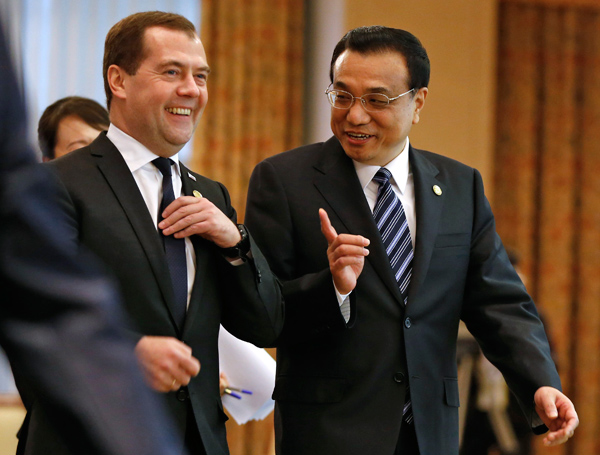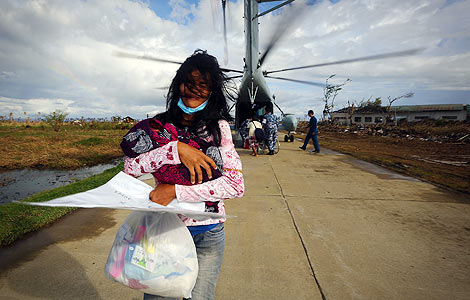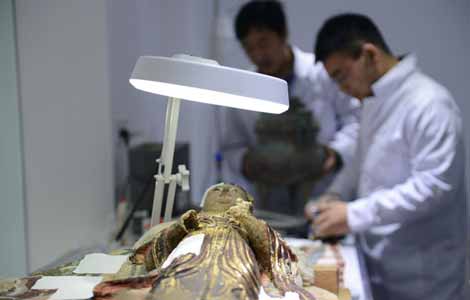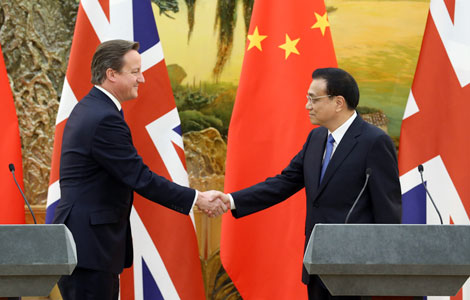

Enhanced pragmatic cooperation between members will help create a prosperous and secure regional community
 |
|
Premier Li Keqiang talks with his Russian counterpart Dmitry Medvedev before the 12th prime ministers' meeting of the Shanghai Cooperation Organization in the Uzbek capital of Tashkent. [Photo/Agencies] |
Held in Tashkent, the capital of Uzbekistan, on Thursday and Friday, the meeting demonstrated the aspirations, confidence and determination of the member states to build regional peace, security and prosperity by upholding the Shanghai Spirit and providing guidance for the organization to stride forward toward the goal of a regional political, security, economic and social community.
Unanimous and sound judgments on the global economic situation were made at the meeting, and accordingly ways to enhance cooperation and exchanges to secure smooth economic growth and jointly address a variety of challenges were put forward. Such collective judgments reflect the high degree of political mutual trust among the member states, as well as their desire to actively collaborate with each other in dealing with challenges.
A variety of cooperation deals were signed at the meeting, aimed at implementing the consensus reached at the Bishkek Summit, fully manifesting the resolution of the member states to implement the various cooperation projects that exist within the SCO, and increase the efficiency in future cooperation. For example, the meeting highlighted the importance of implementing the Programme of Multilateral Trade and Economic Cooperation of the SCO Member States, the list of measures to further promote the SCO project cooperation in 2012-16, and other cooperative documents, and put forward relevant proposals for their implementation.
There were also new operational cooperative initiatives, ideas and plans put forward at the meeting, reflecting the high expectations and confidence of the member states in the benefits of future pragmatic cooperation within the SCO. Negotiations on the creation of an SCO development bank and SCO development fund are also to be promoted and an inter-governmental agreement on international road transport facilitation is to be signed at an early date.
A number of new areas of cooperation, including customs, agriculture, natural disaster prevention and mitigation, public health, environmental protection, culture and tourism, were given special attention and will be made new growth points for future SCO cooperation.
Chinese Premier Li Keqiang participated in the meeting for the first time and his pragmatic diplomatic style brought a new trend to the meeting.
Li made a six-point proposal on deepening practical cooperation among the SCO countries, involving security cooperation, road interconnectivity, trade and investment facilitation, financial cooperation, ecological protection and energy cooperation and, culture and people-to-people exchanges.
These points were specific in their practicality. For example, with regard to security cooperation, Li suggested that cracking down on terrorist activities and drug trafficking be scheduled as the major areas for cooperation among SCO countries and the SCO's anti-terror organizations be given anti-drug functions.
In terms of transport cooperation, Li proposed speeding up road interconnectivity, and said that China is willing to provide support in technology, equipment and financing for the building of a “Silk Road Economic Belt”. To promote trade and investment, Li also proposed simplifying procedures for customs clearance, eliminating trade barriers and enhancing cooperation in producing and processing farming and livestock products.
The agenda and the results of the meeting show that the SCO member states have been maintaining the healthy and stable development momentum in political cooperation, security cooperation with close communication, mutually beneficial economic cooperation and cultural exchanges featuring mutual respect.
Cooperation in the political, security, economic and cultural fields are of great importance to the SCO member states and are also the basic content of their cooperative initiatives within the SCO. The current goals of the SCO are to upgrade strategic mutual trust and cooperation, firmly support each other's core concerns and safeguard member states' sovereign independence and territorial integrity through political cooperation. They will also consolidate mutual security guarantees and maintain regional stability through security cooperation among the member states. To increase the mutual benefits for member states and promote state and regional economic prosperity, they will effectively increase their economic cooperation. The member states also seek to enhance mutual understanding among their peoples and strengthen the base for friendly cooperation through cultural cooperation.
It should be noted that China's endeavor to promote cooperation within the SCO framework is in line with its strategic interests to build a harmonious surrounding environment. Moreover, comprehensive cooperation within the SCO accords with other member states' basic demands for regional peace, security, development and prosperity.
The author is an assistant research fellow at the Institute of Russian, East European and Central Asian Studies, Chinese Academy of Social Sciences.







